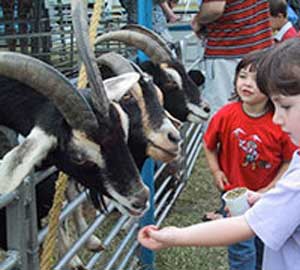HUS E. coli is a life-threatening disease that children can contract from exposure to pathogenc E. coli at petting zoos or other animal exhibits commonly visited in summer and fall by families on outings to apple orchards, pumpkin patches, festivals and fairs. The National Association of State Public Health Veterinarians sets a compendium of safety measures for animal venue operators to follow, but the health of children who touch animals, feed animals or even touch railings or enclosures comes down to handwashing and vigilance supported by the operators.
 In Minnesota, where state officials have investigated two sizable outbreaks of toxic E. coli infections at petting zoons in the past two years, the state Department of Health has published a Prevention Fact Sheet. It emphasizes two precautions for attendees: Hand washing and keeping children’s hands away from their mouths. “We encourage people to interact with animals while at the same time taking precautions,” the agency says in its Staying Safe at Petting Zoos and Fairs advisory.
In Minnesota, where state officials have investigated two sizable outbreaks of toxic E. coli infections at petting zoons in the past two years, the state Department of Health has published a Prevention Fact Sheet. It emphasizes two precautions for attendees: Hand washing and keeping children’s hands away from their mouths. “We encourage people to interact with animals while at the same time taking precautions,” the agency says in its Staying Safe at Petting Zoos and Fairs advisory.
Most recently in Minnesota, the Zerebko Zoo Tran traveling petting zoo was linked to an outbreak of E. coli O157:H7 that sickened 15 people, including seven who were hospitalized. Two of the most severely injured patients fought kidney failure and other health deficits caused by HUS, also known as hemolytic uremic syndrome. No deaths were reported. Health officials confirmed illnesses in four places where the petting zoo operated: Nashwauk, Minn.; Olmsted County, Polk County and Rice County in Faribault. One of the victims was only 2 years old.
HUS lawyer Fred Pritzker, who filed an E. coli lawsuit on behalf of a 2-year-old boy who died from HUS in North Carolina in 2012, said parents are often disadvantaged at petting zoos and animal exhibits. That’s because some operators don’t do a good job of maintaining hand-washing stations or of clearing manure from animals on display. The same operators are supposed to provide ample warning signs to remind people of the danger. E. coli organisms harbor in the feces of cattle, sheep, goats, deer and other ruminants. A child can become contaminated merely by touching a dirty railing and then putting that hand to their mouth. The pathogens also lodge in the fur of petting zoo animals from contact with the ground.
“Operators need to be far more aggressive on sanitation issues,” said Pritzker, who sued the Cleveland County Fairgrounds and one of its vendors for negligence that included a lack of hand-washing supplies in the tragic case of Hunter “Gage” LeFevers. “Vendors understand the terrible threat to children better than anyone. Why don’t they go absolutely overboard to keep their guests safe?”’
Two-year-old Gage LeFevers of Bessemer City, N.C., died Oct. 12, 2012 after struggling days in the hospital. He was an only child and one of more than 100 other people who reportedly were sickened by E. coli while attending the Cleveland County Fair that year.
From the Minnesota Department of Health and the Centers for Disease Control and Prevention, families are advised to wash hands with soap and water for a good 20 seconds immediately after exposure at any petting zoo, livestock show or other animal exhibit. Hand sanitizers are less effective, but should be used if soap and water is not available. Then wash with soap and water at your earliest convenience. Avoid drinking, eating or the use of pacifiers while in attendance at the exhibit and closely attend small children to keep their hands away from their mouth. Be aware that E. coli bacteria can follow you home in the form of dirt on shoes or clothing. Immediately clear any obvious debris from shoes and clothing and clean those items after the outing.





This material should be sent to Lincoln County health officials in Oregon where one child died recently and two others were hospitalized.
In a previous story on this site titled, “Source of Oregon E. coli Cases is Not Otis Restaurant, But What Is?” a link was given to a statement released by Lincoln County health officials.
The statement seemed more concerned with calming the public than advising about safety because surprisingly it did not even mention petting zoos or having contact with animals even though the article stated that at least two of the children had contact with a pet goat.